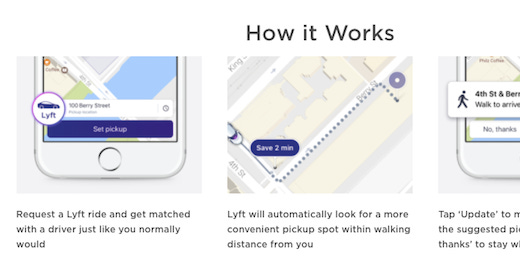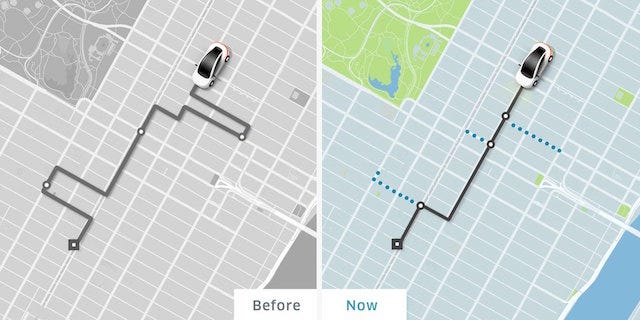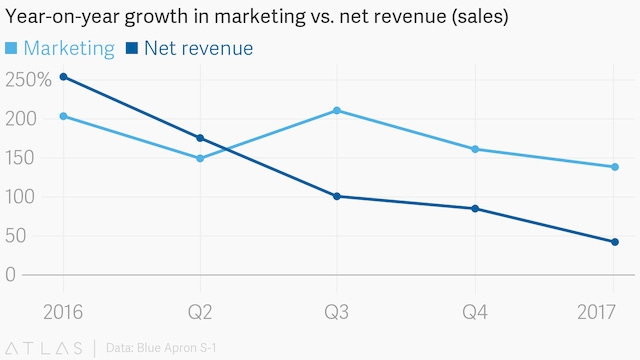It pays to be good.
“For a while there was this idea that we are treating people well, and we are going to get beaten by a competitor that is more aggressive,” Zimmer recently told the Financial Times. “There was a misunderstanding about those values [not being] tied to building a great business, which they are.”
Lyft’s share of the US ride-hailing market has climbed from the low 20% range to about 30% this year; the company said yesterday (July 5) that it had reached 1 million rides per day. Like Uber, Lyft loses money, though those losses are on a totally different scale. (Lyft: lost $600 million on revenue of $708 million in 2016. Uber: lost $3.8 billion in 2016 on $6.5 billion in net revenue.)
Anyway, back to being the good guy. “It demonstrates that values do matter and ethics do matter,” says Zimmer, of Lyft’s recent growth in popularity. It’s unclear what specifically is behind it, but #deleteUber, general anti-Uber sentiment, and savvy Lyft marketing all seem like good guesses. But is Lyft really that good? For all that Lyft has Uber beat on corporate culture, the service itself isn’t that much better or nicer or more ethical or whatever term you prefer. Lyft has gone toe-to-toe with Uber on the price cuts despised by drivers. Like Uber, it plays games on fares, advertising earnings “guarantees” that come with a lot of strings attached. Arguably the best thing Lyft has done for drivers—and its biggest differentiator from Uber—is to allow tipping from day one.
Elsewhere, Lyft made a bus:
Lyft calls this “pickup suggestions.” Uber debuted a similar feature in Manhattan in late May that prompts riders to walk to a convenient corner during shared rides to make the trip faster and more direct. This is, you know, pretty comparable to what buses do, with their “stops” that people “walk to” and “wait at.” The basic advantage of Uber and Lyft has always been immediacy, but immediacy comes at a price premium. The idea of UberPool and Lyft Line is that you trade an immediate pickup and private ride for a somewhat less speedy pickup and the company of a stranger, and in exchange you get a discount. The idea of UberPool and Lyft Line with suggested pickups seems to be that you trade immediacy and privacy AND the convenience of having a car come to your door for a discount AND so that Uber and Lyft can send their cars along fewer, more efficient routes, which, again, is a lot like how public bus systems work.
Wait, I’m sorry, did I say bus? I meant, “prioritizing human heuristics.”
Harassment.
On the opposite end of being good is being bad, which is what several male venture capitalists allegedly were to women in the industry. Justin Caldbeck is out at Binary Capital and the firm in crisis after six women accused him of unwanted sexual advances. Dave McClure, founder and general partner at seed investment group 500 Startups, resigned July 3, a few days after a female entrepreneur spoke to the New York Times about his inappropriate behavior during her recruiting process at the firm, including a Facebook message that read, in part, “I was getting confused figuring out whether to hire you or hit on you.” Uber’s 2017 crises began with Susan Fowler’s blog post about being propositioned by her manager. The company has lost several top executives so far this year over their alleged sexual misconduct.
Sexism is nothing new in Silicon Valley, but this time for a change the allegations of women are being taken seriously. That seems largely due to the women themselves, who are being particularly forthright and detailed in their accounts of harassment. This account from Cheryl Yeoh, for example, alleges not simply that McClure behaved inappropriately toward her, but that he stayed late at a brainstorming session at her apartment, “kept pouring scotch” into her glass, and, ultimately, propositioned her and then backed her into a corner and forcibly kissed her. “When facts and details are not publicly disclosed, the whole matter gets lumped into one big black box of inappropriateness,” Yeoh writes. “Non-consensual, sexual advances are not the same as flirtatious comments from a creepy dude.”
Could the tech industry have reached an inversion point? Venture capitalists accused of harassment, like Caldbeck, are losing their institutional support. Companies that harbored and even encouraged bad practices, like Uber, are laying off their worst offenders and declaring their resolve to do better. An optimistic reading is that tech is finally coming to grips with the depths of its sexism problem, and has decided to do something about it. A more cynical take is that sexual harassment in 2017 has become a liability that threatens the success of startups and venture capitalists in a way it never did before, and regardless of their opinions on women’s rights, it is in the best interest of those companies and VCs to try to fix it.
Meanwhile, the men accused are issuing mea culpas on Medium, of course:
Chris Sacca: I Have More Work to Do.
Dave McClure: I’m a Creep. I’m Sorry.
While at least one other man on Medium feels strongly that they did nothing wrong.
Failure to deliver.
Blue Apron served up a lukewarm IPO on June 29. Tech startup stocks tend to pop during their market debut, a sort of general sign of investor enthusiasm. But not Blue Apron. Its shares priced at $10, traded most of their first day at $10, and closed at, yup, $10.
What Blue Apron did do was throw an elaborate party outside the New York Stock Exchange. There were caterers passing out steak on lattice potato chips and tiny chicken burgers, and booths booths shaped like giant cardboard Blue Apron boxes that served sample ramen noodles (with sweet corn and kirby cucumbers) and fish tacos (wild Alaskan rockfish, red cabbage, and scallions). There were blue-painted crates piled high with produce and bass-heavy speakers that blared pop hits. The main attraction was a cooking competition, held in front of a towering wall of salad greens with a white apron cutout pinned to its center.
It’s fitting that Blue Apron’s public debut was a marketing stunt. Over the last three years, the meal-kit company has spent more than $200 million selling its boxes of recipes and pre-portioned ingredients to US consumers. That money has gone to podcast ads, customer referrals, discounts on first orders, and fliers sent through the mail. In 2016, Blue Apron spent $144 million on marketing. In the first quarter of this year alone, that number was $60.6 million.
Lots of startups—especially food delivery ones—subsidize their service to make it more attractive to consumers. The key questions for most of these companies is whether the growth they fuel with marketing is sustainable, and whether customers drawn in by promo offers keep ordering once it costs full price. For Blue Apron, there are already signs that marketing has diminishing returns.
Elsewhere, meal-kit company Home Chef is contemplating a sale:
Home Chef could fetch more than $600 million based on expected 2017 revenue of more than $300 million, the sources said on Thursday. Such an outcome would show that Amazon's $13.7 billion deal this month to buy Whole Foods Market Inc (WFM.O) is not perceived as a major threat to companies such as Home Chef.
That was before the Blue Apron IPO. It will be interesting to see if anything changes.
Kangaroos.
Here is a short list of things self-driving cars still have trouble with: bridges, red lights, snow, the “California stop,” the “Pittsburgh left,” and now, kangaroos:
Volvo’s self-driving car is unable to detect kangaroos because hopping confounds its systems, the Swedish carmaker says.
The company’s “Large Animal Detection system” can identify and avoid deer, elk and caribou, but early testing in Australia shows it cannot adjust to the kangaroo’s unique method of movement.
The explanation from Volvo is that their autonomous cars detect objects using the ground as a reference point and kangaroos, well, aren’t always on the ground. “When it’s in the air, it actually looks like it’s further away, then it lands and it looks closer,” says David Pickett, a technical manager.
Kangaroos routinely leap 5 feet (1.5 meters) high, according to this story from the BBC, so you can see why that might be hard for a car laser-focused on the ground to keep track of. “We are developing a car that can recognize kangaroos,” Volvo Australia managing director Kevin McCann says. Well, good! What about the other animals that bound and leap? What about children who skip or, I don’t know, ride pogo sticks? I hope there are also Medium and Small Animal Detection systems to supplement the Large Animal Detection system. Where I’m from in New England, squirrels can be tricky.
Other stuff.
Shares of a Publicly Traded Uber Might Be Crashing. Uber probes handling of rape case in India. Uber begs employees not to quit. Uber board directors viewed due diligence report on Otto. Schnucks expands Instacart partnership. Instacart loses CMO Cheryl Law. Homer Logistics raises $8.5 million. Drive.ai raises $50 million. Kakao raises $437 million for Korean ride-hailing service. Postmates nears deal on class-action lawsuit. Lyft opens service centers for drivers. Uber heads to Alaska. Uber lets you call rides for other people. Black lawmakers urge Uber to diversify. Grubhub co-founder launches on-demand handyman service. Fiverr adds a “pro” level of service. Delivery startups tweaked their algorithms for Fourth of July. Korean Couple Find Hidden Camera at Airbnb House in Japan. Airbnb flats used as makeshift brothels. DC weighs mandatory inspections for Airbnbs. Home-sharing for women. Couple charged $900 for 30-mile Uber ride. Indonesia sets ride-hailing tariffs. Encrypted rideshare. Self-driving forklifts. Self-driving truck has no room for a human.








